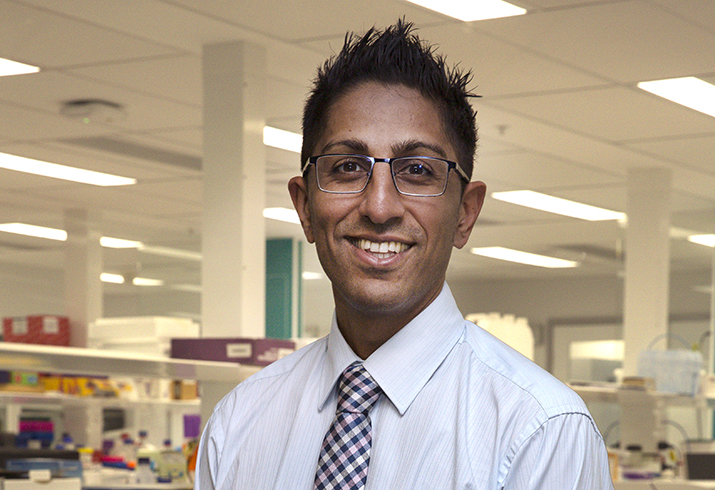Three questions with Dr Rishi Kotecha

Dr Rishi Kotecha is a consultant in clinical haematology and oncology at PCH, Co-head of the Leukaemia Translational Research laboratory at Telethon Kids Institute and Associate Professor at Curtin Medical School.
Dr Kotecha is involved in a range of national and international research collaborations with high profile groups including the U.S based Children’s Oncology Group (COG) and the international Berlin-Frankfurt-Münster study group . Within these groups he is responsible for the design and implementation of clinical trials for children with leukaemia worldwide and for babies with acute lymphoblastic leukaemia.
Dr Kotecha is an inaugural member of the National Blood Cancer Taskforce, established to improve the diagnosis, treatment and understanding of blood cancers. He is also the clinical lead for paediatric leukaemia and lymphoma for WA with ANZCHOG and the WA principal investigator for more than 10 clinical trials. Dr Kotecha is one of only three chairs to be appointed to lead a COG trial from Australia and New Zealand.
At the start of his medical career, he never envisaged specialising in oncology, achieving international recognition for his research work nor remaining long term in Perth. However during his time as a medical registrar at Princess Margaret Hospital he became inspired by the oncology patients he met to specialise in this field and enrol in a PhD.
We posed three questions to Dr Kotecha about his research work.
Why are you passionate about research?
My scientific thinking was stimulated after completing a small research project at PMH during my time as a medical registrar. I realised that research can be really rewarding and can have a huge impact on patient care, particularly when you have the potential to influence treatment protocols.
I also became aware that to make a difference globally you need to be at the ‘back end’, changing things from a scientific perspective. I decided the only way I could do that was to enrol in a PhD to learn about molecular techniques, genetic analyses and the development of preclinical models in the laboratory.
My research field can be challenging, particularly managing the workload between the lab and the hospital but my patients always come first. Making a difference to just one patient gives me the drive to keep going. Seeing what they go through makes me grateful for the work I do.
Once you have developed a treatment protocol that’s followed by other clinicians, it gives you satisfaction that you’re positively influencing the lives of children on a global scale. The heartfelt gratitude that many families express is something you never forget, and I’ve been touched by the enormous difference you can make to a patient through research.
What research achievement are you proudest of?
My first big project involved a paediatric meningioma paper published in the Lancet Oncology in 2011. It was inspired by one of my patients who had this type of brain tumour. There was no published literature on that condition available at that time and no treatment guidelines available. This work took a long time because I analysed data of similar cases from around the world. It was an immensely rewarding project because it resulted in new management guidelines which continue to be actively followed around the world to this day.
I’m also proud to have been appointed Co-chair of an upfront COG clinical trial in 2019. There is no higher honour in our field. The trial is looking at the use of a novel drug, venetoclax, to help treat babies with infant acute lymphoblastic leukaemia in combination with chemotherapy. This drug was discovered in Australia, and we have successfully conducted extensive pre-clinical studies using venetoclax in our lab. The trial will hopefully open to patients next year.
What advice would you give to your younger self?
I’d encourage anyone to consider embarking on a research project.
I never thought I’d pursue this path but without a doubt, if you persevere with a research career it makes you a better doctor. The additional knowledge you gain together with a deeper understanding of the science enables you to understand more about diagnostics and treatment options.
Don’t be deterred by the difficulties you face in the beginning. Give things a chance to develop and take the long road because you will reap the rewards.

